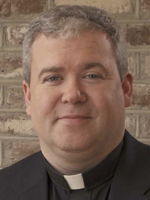Editor’s note: This is the final part of a series for Lent.
At a time when our society is discussing and debating health care, social assistance and immigration, it is helpful to look to the saints. The message of the Gospel is often dismissed as if it has nothing to offer, yet the examples of the saints show us a different reality.
When our country was in great transition, God sent us a strong guide in the person of Frances Xavier Cabrini.
Frances was born in 1850 in northern Italy. She was premature and had delicate health throughout her life. Her family owned a large cherry tree farm, and Frances developed a strong work ethic and sense of responsibility.
She wanted to join the convent, but had to wait due to her health. She took vows in 1877 at age 22, and worked in a local orphanage.
However, the orphanage closed in 1880, and Frances felt called to start her own order. She founded the Missionary Sisters of the Heart of Jesus, and was known as Mother Cabrini. The young order began to run orphanages and schools in Italy.
In 1889, Pope Leo XIII sent Mother Cabrini to New York City to assist the Italian immigrants. She could not speak English, and had never been to the United States. Nevertheless, she collected the sisters and headed to the new world.
The Lord Jesus teaches: “Blessed are those who are persecuted for righteousness’ sake, for theirs is the kingdom of heaven” (Mt 5:10).
When the missionary sisters arrived in New York, they understood this teaching. The immigrant community was suffering from the prejudices of the native-born Americans, and were exploited by the earlier immigrants who had settled and become accustomed to the American way of life.
Many immigrants worked in hazardous mills or sweatshops. Some were engaging in criminal activity, and the community was marked by a sense of being forgotten and alone.
There were no advocates or government sources to help the new arrivals. Church and family life were stretched and suffered greatly.
Mother Cabrini went to work immediately. The sisters knocked on doors, begged for food, gave to others what they received, and labored to care for the sick, children and people in need.
They were not a welcome presence by many outside of the community, but the sisters heroically continued their mission work.
St. Frances learned English, sought advocacy and assistance for the immigrants, and began to strengthen people to be good neighbors to one another. She showed the immigrants their responsibility to care for the needy and to give attention to those who were without help.
Endowed with great charm and keen administrative abilities, Mother Cabrini eventually established 67 institutions throughout the United States, including hospitals, orphanages and schools.
There were sisters in South America, amidst political instability and language barriers, and St. Frances also set up schools and orphanages in Europe.
In all of these efforts, Mother Cabrini sought to show the blessings of the kingdom of God. She desired to serve the sick and poor, forgotten and lonely.
In 1909, Mother Cabrini became a naturalized U.S. citizen. She died from poor health in 1917 at 67 years of age.
In 1946, St. Frances Xavier Cabrini became the first U.S. citizen to be canonized. Her statue is currently the only display of an American in St. Peter’s Basilica in Rome.
The life of Mother Cabrini can be a helpful contribution to our discussion on social questions. In each area, from health care to immigration, the saint sought to live and to teach others to live the signs of the kingdom of God through generosity, compassion and kindness.
Father Jeffrey Kirby is a priest of the Diocese of Charleston currently studying moral theology in Rome.

